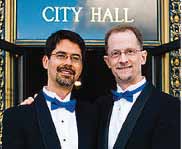 Last week’s shocking public letter from Roy Moore, Chief Justice of the Alabama Supreme Court, urging Alabama Governor Robert Bentley to ignore a federal court ruling and continue to exclude same-sex couples from the freedom to marry, appalled us for many reasons. The letter also instilled in us even deeper respect, admiration, and connection to LGBT Alabamans who bravely seek dignity and equality in their home state, and for all Alabamans who stand for equality, the United States Constitution, and the rule of law.
Last week’s shocking public letter from Roy Moore, Chief Justice of the Alabama Supreme Court, urging Alabama Governor Robert Bentley to ignore a federal court ruling and continue to exclude same-sex couples from the freedom to marry, appalled us for many reasons. The letter also instilled in us even deeper respect, admiration, and connection to LGBT Alabamans who bravely seek dignity and equality in their home state, and for all Alabamans who stand for equality, the United States Constitution, and the rule of law.
On January 23, 2014, Federal District Judge Callie Granade, a George W. Bush appointee, held that Alabama’s “Sanctity of Marriage” amendment that excludes same-sex couples from marriage violated the United States Constitution. Four days later, Chief Justice Moore, who as a state court judge has nothing to do with the federal litigation, wrote a letter that illuminated his ignorance of the separation of religion and state and his disregard for both the Supremacy Clause of the United States Constitution and Alabama’s history of racism and sexism in marriage.
Chief Justice Moore’s primary legal citation supporting his view of the “sanctity” of Alabama’s exclusionary marriage law was an 1870 case, Hughes v. Hughes, in which the Alabama Supreme Court “described marriage as ‘a divine institution,’ imposing upon the parties ‘higher moral and religious obligations than those imposed by any mere human institution or government.’” What Chief Judge Moore omits is that Hughes v. Hughes was a case in which a husband successfully prevented his wife from divorcing him because the Alabama Supreme Court did not believe her testimony that she lived in “perpetual fear” that her husband was going to do great physical harm to her or kill her. Indeed, Alabama law at the time required a wife to prove such a threat to her safety beyond a “reasonable doubt” and required that “the wife should be…without fault on her part.” We see nothing “moral” or “divine” in that type of marriage law.
Chief Justice Moore also failed to consider that the Hughes case was decided just five years after the 13th Amendment to the United States Constitution forced the state to end slavery, and that indeed Alabama’s purportedly “sacred” marriage laws excluded slaves from marriage, as did the laws of every other slave state.
But Chief Justice Moore’s letter did not end with citing the Hughes case. He went on to invoke the Bible and his personal religious beliefs in the exercise of his function as the state’s chief judicial officer. He stated: “The laws of [Alabama] have always recognized the Biblical admonition stated by our Lord: But from the beginning of the creation God made them male and female. For this cause shall a man leave father and mother, and cleave to his wife. And they twain shall be one flesh: so then they are no more twain, but one flesh. What therefore God hath joined together, let no man put asunder. (Mark 10:6-9).”
Chief Justice Moore’s words chillingly echo the religious proclamation of the trial judge whom the Supreme Court reversed in Loving v. Virginia, the case in which the Supreme Court held that bans on interracial couples’ marrying violated the Constitution. The trial judge had declared:
“Almighty God created the races white, black, yellow, Malay and red, and he placed them on separate continents. And but for the interference with his arrangement there would be no cause for such marriages. The fact that he separated the races shows that he did not intend for the races to mix.”
Chief Justice Moore’s letter fails to mention that Alabama’s purportedly “divine” marriage laws also stated for over a century that interracial couples were prohibited from marrying. In fact, Alabama was the last state to take such a ban off the books when it did so by referendum in 2000, over thirty years after the Supreme Court had ruled it unconstitutional and unenforceable. An astonishing forty percent of the Alabama electorate—over half a million voters—voted to keep the law on the books, just fifteen years ago.
We are proud of Alabamans like James Strawser and John Humphrey, a gay couple from Mobile who, without a lawyer, sued and won the right to marry in Alabama federal court last week. As reported on the Alabama news site, AL.com, when James and John “applied for a marriage license…the clerk ‘had a fit’ and told them she could not issue it.” James explained: “I could not make a marriage work with a lady,” and “I felt like we had just as much right to marry as anyone else.” Upon winning, John exclaimed, “I am just ecstatically pleased. We…did not even think [the judge] would consider it…This is the Bible Belt for Christ sake.” As the struggle in Alabama continues, Strawser wrote on his Facebook wall: ‘I plan to stand up [and] fight back. [W]e have just as many rights as anyone does in the world. [Let’s] stand together…[W]e all have equal rights no matter who…we are.”
We stand with James and John and all those working to make Alabama the 37th state with marriage equality and a state where LGBT people, and indeed all people, can live with dignity and equality.
John Lewis and Stuart Gaffney, together for three decades, were plaintiffs in the California case for equal marriage rights decided by the California Supreme Court in 2008. They are leaders in the nationwide grassroots organization Marriage Equality USA
Recent Comments